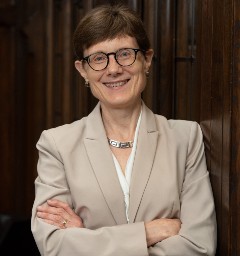Cristina Traina
-
Originally from Berkeley, California, Cristina Traina grew up in central Indiana and eastern Pennsylvania. She attended Princeton University, where she majored in Religion. She earned her M.A. in Religion and her Ph.D. in theology at the University of Chicago Divinity School, where she studied with Anne Carr, David Tracy, Robin Lovin, James Gustafson, and William Schweiker.
Traina came to Fordham in 2020 from Northwestern University, where she taught for nearly 30 years in the Department of Religious Studies. She has been active in the Society of Christian Ethics throughout her career, serving as Board member, as President, as member of the 21st Century Committee, and as co-chair of the 2018-2020 taskforce that conducted a nation-wide survey of tenure-line and contingent faculty in religious studies and theology. She has served on the editorial boards of various journals. She is an active member of the Catholic Theological Society of America, the America Academy of Religion, and Societas Ethica. A member of the advisory board for New Ways Ministry, she also writes occasionally for its blog, Bondings 2.0.
Professor Traina’s research focuses on critical and constructive Christian feminist ethics, with a specialty in Catholic ethics. Areas of special expertise include sexuality, ethics of relationship, methodological questions, and moral agency, in particular children’s moral agency. She has additional interests in bioethics, migration, intersectionality, and economic and political justice.
-
Ph.D. in Theology, University of Chicago Divinity School
M.A. in Religion, University of Chicago Divinity School
A.B. in Religion, Princeton University -
Professor Traina’s research focuses on critical and constructive Christian feminist ethics, with a specialty in Catholic ethics. Areas of special expertise include sexuality, ethics of relationship, methodological questions, and moral agency, in particular children’s moral agency. She has additional interests in bioethics, migration, intersectionality, and economic and political justice.
In her current project, Children Out of Place and Moral Agency, she explores the implications for ethical conceptions of moral agency of children who are “out of place” according to Western liberal notions of childhood. Each instance demands a different revision of moral agency and of childhood, and each questions American assumptions about and practices of childrearing and education. They include children who work for pay; children who migrate unaccompanied; children who are recruited by armies and gangs; children active in labor movements and politics; and children who must decide how to respond to intersex or transgender identity.
-
Books
Finitude, Feminism, and Flourishing: On Being Mortal, Like Everyone Else. 2023 Madaleva Lecture in Spirituality. New York: Paulist Press, 2024.
Erotic Attunement: Parenthood and the Ethics of Sensuality between Unequals. Chicago:
University of Chicago Press, 2011.Feminist Ethics and Natural Law: The End of the Anathemas. Washington, DC:
Georgetown University Press, 1999.Recent articles
“Integrity, Vulnerability, and Temporality,” De Ethica 7, no. 3 (2023): Special Issue: Vulnerability and Integrity – Part 1: 30-46. https://doi.org/10.3384/de-ethica.2001-8819.2373
“Christian Feminist Theological Ethics,” St Andrews Encyclopaedia of Theology. Edited by Brendan N. Wolfe, et al. August 23, 2023. https://www.saet.ac.uk/Christianity/ChristianFeministTheologicalEthics
“Family/ies and Transcendence.” In The Transcendent Character of the Good: Philosophical and Theological Perspectives, 193-209. Edited by Petruschka Schaafsma. New York: Routledge, 2023.
“Ecclesiology and Trans* Inclusion.” Journal of the Society of Christian Ethics 42 no. 2 (Fall/Winter 2022): 363-382.
“’The Power of Anger in the Work of Love,’ Revisited: Theological Anthropology, Ethics, and Emotion.” The Human in a Dehumanizing World: Reexamining Theological Anthropology and Its Implications, 14-32. Ed. Jessica Coblentz. Maryknoll, NY: Orbis, 2022.
“How Gendered Is Marriage?” In Sex, Love, and Families: Catholic Perspectives, 79-90.
Edited by Jason King and Julie Hanlon Rubio. Collegeville, MN: Liturgical Press, 2020.“Sources of Authority in Laudato Si’.” In Laudato Si’ and the Environment: Pope Francis'
Green Encyclical. Edited by Robert McKim. New York: Routledge, 2019.“Local Authoritarianism as a Barrier to Democracy.” Journal of Moral Theology 8, no. 2
(June 2019): 113-121.“Between a Rock and a Hard Place: Unwanted Pregnancy, Mercy, and Solidarity.”
Journal of Religious Ethics 46, no. 4 (December 2018): 658-81.“Holy Family or Holy Child? Child Migrants as Vulnerable Agents.” In Unaccompanied Minor
Children: Social, Legal, and Ethical Proposals. Edited by Hille Haker and Molly Greening, 141-60. Lanham: Lexington Books, 2018.“The Vice of ‘Virtue’: Teaching Consumer Practice in an Unjust World.” Journal of Moral
Theology 7, no. 1 (2018):13-27.
